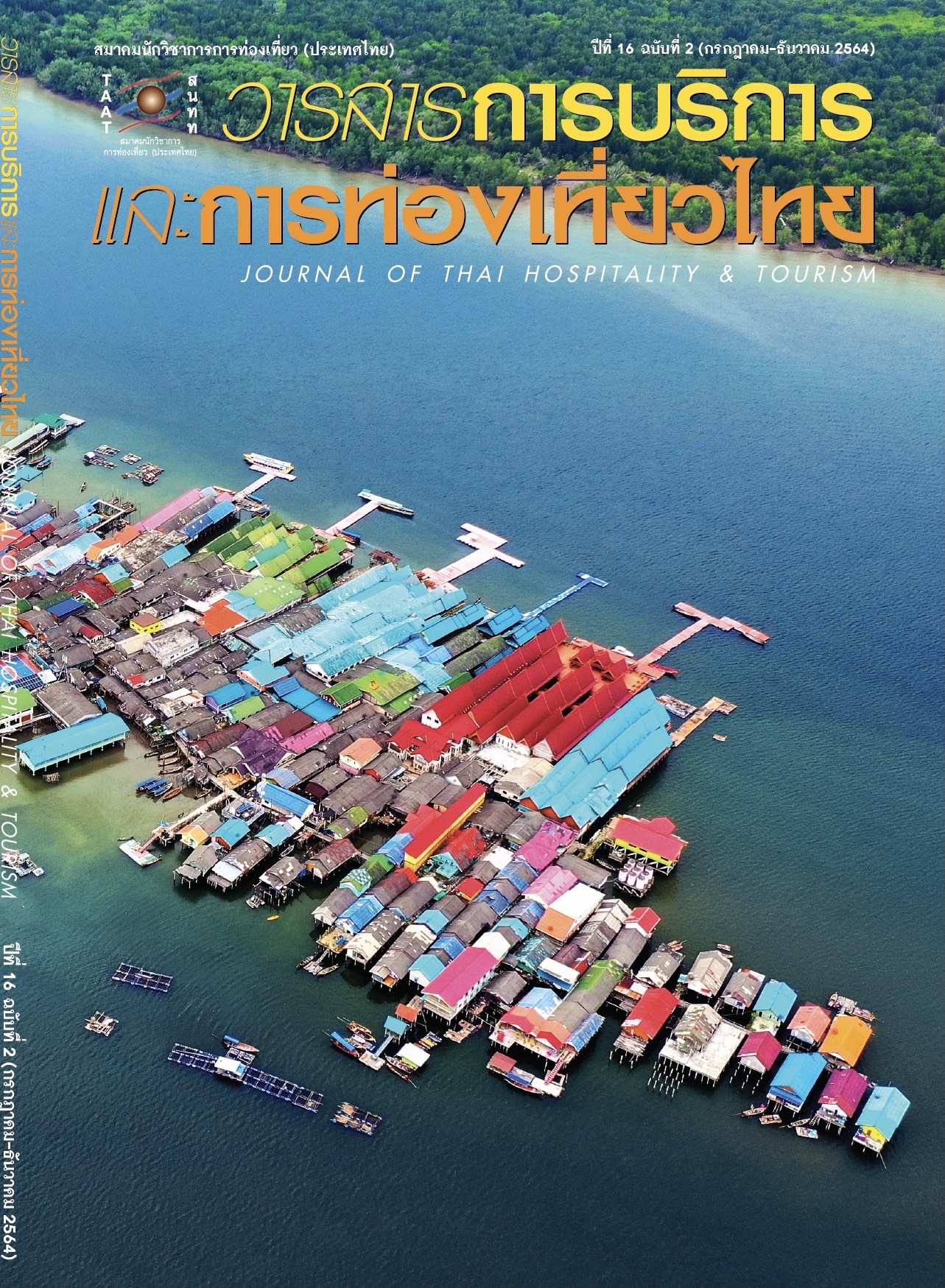นวัตกรรมเพื่อความอยู่รอด กรณีศึกษารูปแบบโรงแรมทางเลือกใหม่ โรงแรม Cassia ท่ามกลางการเติบโตของระบบเศรษฐกิจแบบแบ่งปัน
Main Article Content
บทคัดย่อ
การก่อตั้งบริษัทแอร์บีเอ็นบี ในปี พ.ศ. 2551 ได้สร้างสัญญาเตือนในแก่โรงแรมต่างๆ ที่มีอยู่ในตลาดถึงการมีภัยคุกคามจากผู้แข่งขันรายใหม่ การศึกษานี้ให้ความสำคัญกับโรงแรมแบรนด์ใหม่ในเครือโรงแรมบันยันทรี และได้ใช้ข้อมูลทั้งในส่วนที่เป็นข้อมูลปฐมภูมิ ซึ่งรวมถึงการสัมภาษณ์กับทางผู้บริหารโรงแรม และข้อมูลทุติยภูมิ ที่ได้ทำการศึกษากลยุทธ์ของโรงแรมบันยันทรีซึ่งนำไปสู่การสร้างนวัตกรรมในการสร้างแบรนด์ใหม่ ดังนั้น การศึกษานี้จึงเป็นการศึกษาที่ชี้ให้เห็นถึงวิธีการที่โรงแรมต่างๆสามารถนำไปใช้ในการจัดการสร้างนวัตกรรมทางธุรกิจที่แตกต่างไปจากการดาเนินการทางธุรกิจแบบเดิมๆ เพื่อให้ธุรกิจสามารถดำเนินไปได้ในระยะยาว และในสิ่งแวดล้อมที่เปลี่ยนไป
Article Details
เอกสารอ้างอิง
Adam, J. & Khan, H. (2007). Research Methods for Graduate Business and Social Science Students. New Delhi: Sage Publications.
Bank of Thailand. (2018). Tourism Indicators. Retrieved from http://www2.bot.or.th/statistics/ReportPage.aspx?reportID=875&language=eng
Banyan Tree Holdings Limited. (2015). Annual Report 2014 A Journey of Transformation. Retrieved from http://media.corporate-ir.net/media_files/IROL/20/200797/BTH_AR2014_SGX.PDF
Barnett, B. (2015). Phuket 2015 Hotel Market Update. Phuket: C9 Hotelworks Company Limited.
Chen, W. J. (2011). Innovation in Hotel Services: Culture and Personality. International Journal of Hospitality Management, 30(1), 64–72.
Creswell, J. (2014). Research Design. London: Sage Publications.
Damanpour, F., Walker, R. M. & Avellaneda, C. N. (2009). Combinative Effects of Innovation Types and Organizational Performance: A Longitudinal Study of Service Organizations. Journal of Management Studies, 46(4), 650–675.
Dawson, C. P. & Brown, T. L. (1988). B&Bs: A Matter of Choice. The Cornell Hotel and Restaurant Administration Quarterly, 29(1), 17–21.
Drejer, I. (2004). Identifying Innovation in Surveys of Services: A Schumpeterian Perspective. Research Policy, 33(3), 551–562.
Elo, S., Kääriäinen, M., Kanste, O., Pölkki, T., Utriainen, K., & Kyngäs, H. (2014). Qualitative Content Analysis. A Focus on Trustworthiness, 4(1), 1-10.
Enz, C. A. & Harrison, J. S. (2009). Hospitality Strategic Management: Concepts and Cases. New Jersey: Wiley.
Euromonitor International. (2015). Lodging in Thailand. Retrieved from http://www.euromonitor.com/travel-accommodation
Farmaki, A., Altinay, L., Botterill, D. & Hilke, S. (2015). Politics and Sustainable Tourism: the Case of Cyprus. Tourism Management, 47, 178–190.
Fletcher, J., Fyall, A., Gilbert, D. & Wanhill, S. (2013). Tourism Principles and Practice. Harlow: Pearson.
Gunasekaran, N. & Anandkumar, S. V. (2012). Factors of Influence in Choosing Alternative Accommodation: A Study with Reference to Pondicherry, A Coastal Heritage Town. Procedia–Social and Behavioral Sciences, 62, 1127–1132.
Gunasekaran, N., Peter, S., George, J. & Anandkumar, S. V. (2012). Alternative Accommodation Market in Pondicherry: A Study of Tourists’ Expectations and Experiences Using SERVQUAL. International Journal of Management, 3(3), 8–16.
Guttentag, D. (2013). Airbnb: Disruptive Innovation and the Rise of An Informal Tourism Accommodation Sector. Tourism, 1–26.
Ho, K. P. (2014). The Banyan Tree Group’s Cassia Brand. Singapore: Edipresse Media Asia.
Hooi, J. (2011). Innovation – the Way Ho Kwon Ping Sees It. Retrieved from http://www.asiaone.com/print/News/Latest%2BNews/Business/Story/A1Story20111024-306719.html
Kim, W. C. & Mauborgne, R. (2004). Blue Ocean Strategy. Harvard Business Review, (October), 76–84.
Lam, A. (2015). Banyan Tree Diversifies with Cassia Homes. Retrieved from http://marketing-interactive.com
Mandelbaum, A. (2015). How Virtual Reality Can Help Hotels Compete with Airbnb. Retrieved from http://www.eHotelier.com
Martĺnez-Ros, E. & Orfila-Sintes, F. (2009). Innovation Activity in the Hotel Industry. Technovation, 29(9), 632–641.
Mattsson, J. & Orfila‐Sintes, F. (2014). Hotel Innovation and Its Effect on Business Performance. International Journal of Tourism Research, 16(4), 388–398.
MIT Sloan Executive Education. (2014). How Should Hotels Respond To The Sharing Economy? Retrieved from http://executive.mit.edu/blog/how-should-hotels-respond-to-the-sharing-economy#.VsplAfl9670.
Mullins, L. & Christy, G. ( 2011). Essentials of Organizational Behaviour. Harlow: Pearson.
Orfila-Sintes, F., & Mattsson, J. (2009). Innovation Behavior in the Hotel Industry. Omega, 37(2), 380–394.
Porter, M. E. (1979). How Competitive Forces Shape Strategy. Palgrave: London.
Radder, L. & Wang, Y. (2006). Dimensions of Guest House Service: Managers’ Perceptions and Business Travellers’ Expectation. International Journal of Contemporary Hospitality Management, 18(7), 554–562.
Strong, C. (2014). Airbnb and Hotels: What to Do About the Sharing Economy? Retrieved from https://www.wired.com/insights/2014/11/hotels–sharing–economy
Sundbo, J. & Gallouj, F. (2000). Innovation as a Loosely Coupled System in Services. International Journal of Services Technology and Management, 1(1), 15–36.
TAT. (2015). Tourist Statistics–by Province. Retrieved from http://marketingdatabase.tat.or.th/ewt_w3c/ewt_news.php?nid=1621
Tidd, J. & Bessant, J. (2009). Managing Innovation: Integrating Technological, Market and Organizational Change. West Sussex: John Wiley and Sons Ltd.
Tseng, C. Y., Kuo, H. Y. & Chou, S. S. (2008). Configuration of Innovation and Performance in the Service Industry: Evidence from the Taiwanese Hotel Industry. The Service Industries Journal, 28(7), 1015–1028.
Walliman, N. (2011). Your Research Project Designing and Planning Your Work. London: Sage Publications.
Watkins, E. (2014). Hoteliers react to Sharing-Economy Competition. Retrieved from http://www.hotelnewsnow.com/Article/14348/Hoteliers-react-to-sharing-economy-competition
WTTC. (2015). Travel & Tourism Economic Impact 2015 World. Retrieved from http://www.wttc.org/-/media/files/reports/economic%20impact%20research/regional%202015/world2015.pdf
Yin, R. K. (2009). Case Study Research: Design and Methods. Thousand Oaks, CA: Sage.


